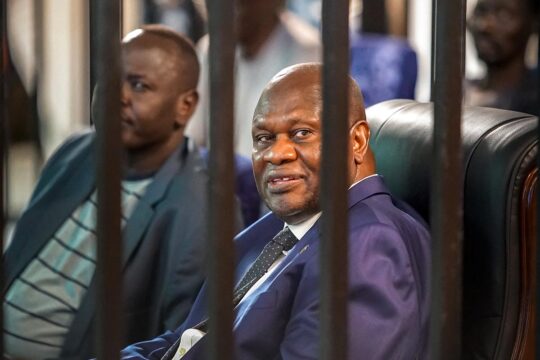Arusha, March 2, 2007 – Having arrived at the start of the week as defence witnesses called by their uncle, Protais Zigiranyirazo, accused of genocide and crimes against humanity before the International Criminal Tribunal for Rwanda (ICTR), Jean-Luc Habyarimana and his sister Jeanne, son and daughter of the former Rwandan president, also had to defend their mother, Agathe Kanziga, in a sort of trial in absentia. Kanziga, who lives in France, had her request for asylum rejected on February 15 by the French Refugee Appeal Board (CRR), who suspects her of having participated with her brother Zigiranyirazo in meetings planning the massacres in the hours following the assassination of her husband on the night of April 6-7, 1994. The prosecution team at the ICTR who has not confirmed whether or not it will prosecute her has lingered for a while on this allegation during these two hearings. Affirming that they stayed with their mother that night, the two witnesses categorically rejected this accusation. “I can not explain to you with words what my mother went through. She was completely lost, as were we,” stated Jean-Luc Habyarimana, underlining that his mother did not have the heart to participate in meetings. “This was a bereaved woman, a woman in mourning,” added the former president’s son. Composed and relatively brief, in contrast to his sister, he equally refuted suggestions of the Tanzanian senior trial attorney of the prosecution, Wallace Kapaya that Kanziga had, by telephone, given instructions in preparation of the massacres. “I didn’t see her phone anyone. I know that my sister Jeanne called the French ambassador. That night, I myself called my brothers in Paris and my uncle (paternal), Dr. Seraphin Bararengana, but I didn’t see my mother phone anyone,” he affirmed. Lastly, he denied that Zigiranyirazo, who lived in another district of Kigali, arrived that night at the presidential residence. According to Michel Bagaragaza, also indicted by the ICTR, the defendant and his sister had taken part, on the night of April 6-7, 1994, in the establishment of a list of people to eliminate. Bagaragaza, detained in The Hague, claims to hold information from a former deceased banker, Pasteur Musabe, who was a friend of the presidential family. Less structured than her brother and often losing herself in interminable narrations before an apparently moved Chamber, Jeanne Habyarimana refuted, at her turn, the allegations against her mother and her uncle. “Numerous lies have been told about many people,” she declared. Moreover, the young woman held on, in a long digression, in defending the memory of her father, before leaving the court. “My father was killed while he was doing his best to bring back peace: he loved peace, he protected the Tutsis, he told me that he was the president of all Rwandans, whether they were Hutus, Tutsis, or Twas,” she claimed. Finally, as if she herself were stunned to see the Judges let her go on her long eulogy, asked, “I don’t know if I should continue.” It was at that moment that the presiding judge, Inès Monica Weinberg de Roca (Argentina), reminded the prosecution to “control the witness.” ER/AT/KD © Hirondelle News Agency
Countries
- Afghanistan
- Algeria
- Angola
- Argentina
- Armenia
- Australia
- Austria
- Azerbaijan
- Bahrain
- Bangladesh
- Belarus
- Belgium
- Benin
- Bosnia & Herzegovina
- Brazil
- Burkina Faso
- Burundi
- Cambodia
- Cameroon
- Canada
- Central African Republic
- Chad
- Chile
- China
- Colombia
- Cote d’Ivoire
- Croatia
- Cyprus
- Dem. Rep. Of Congo
- Denmark
- Ecuador
- Egypt
- El Salvador
- Equatorial Guinea
- Eritrea
- Ethiopia
- Finland
- France
- Gabon
- Gambia
- Georgia
- Germany
- Ghana
- Greenland
- Guatemala
- Guinea
- Haiti
- Honduras
- Hungary
- Indonesia
- Iran
- Iraq
- Ireland
- Israel
- Italy
- Japan
- Jordan
- Kenya
- Kosovo
- Laos
- Lebanon
- Liberia
- Libya
- Lithuania
- Malaysia
- Maldives
- Mali
- Mauritania
- Mauritius
- Mexico
- Myanmar
- Namibia
- Nepal
- Netherlands
- New Zealand
- Nicaragua
- Niger
- Nigeria
- North Korea
- Norway
- Pakistan
- Palestine
- Peru
- Philippines
- Poland
- Republic of Congo
- Russia
- Rwanda
- Scotland
- Senegal
- Serbia
- Seychelles
- Sierra Leone
- Somaliland
- South Africa
- South Korea
- South Sudan
- Spain
- Sri Lanka
- Sudan
- Suriname
- Sweden
- Switzerland
- Syria
- Taiwan
- Tanzania
- Thailand
- Timor-Leste
- Togo
- Tunisia
- Turkey
- Uganda
- Ukraine
- United Arab Emirates
- United Kingdom
- United States
- Uruguay
- Vanuatu
- Venezuela
- Vietnam
- Yemen
- Zimbabwe



